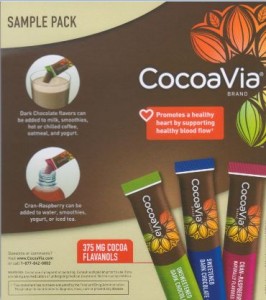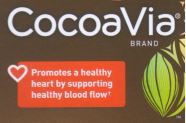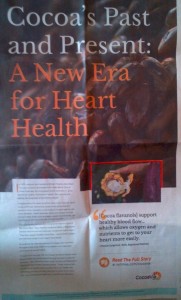This is a book event. The National Arts Club is at 15 Gramercy Park South. For information, click here. Register here.

In case you were wondering why food companies would bother to sponsor research, consider CocoaVia, a chocolate derivative.
At the New York Times’ Food for Tomorrow conference last week, Mars, Inc., gave out samples of CocoaVia cocoa extract.
Here’s the one with sweetened dark chocolate.

And here’s the health claim.

Mind you, “Promotes a healthy heart by supporting healthy blood flow” is not an FDA-approved health claim. CocoaVia is being marketed as a dietary supplement, not a food. The label says it’s a “daily cocoa extract supplement,” and has a Supplement Facts label rather than the Nutrition Facts label used for foods.
It’s interesting that Mars, Inc. originally marketed CocoaVia as chocolate bars. The FDA considers candy bars to be foods, labeled with Nutrition Facts.
But by marketing CocoaVia as a supplement, Mars, Inc. can take advantage of the permissive marketing allowed by the Dietary Supplement Health and Education Act of 1994. This act allows “structure/function” claims on supplements like the one used by CocoaVia. By marketing CocoaVia flavanols as supplements, Mars, Inc. does not have to adhere to the FDA’s more restrictive requirements for health claims on food packages.
I’m surprised that Mars, Inc. is using the supplement route because the company has gone to a lot of trouble to establish a scientific basis for a health claim for its processed cocoa flavanols.
Is it possible that Mars, Inc. thinks the cocoa flavanol claim won’t hold up to FDA scrutiny.
Here again are the three studies funded by Mars, Inc. (I posted them as examples of industry-funded studies with results favorable to the sponsor’s interest).
1. Cocoa flavanol consumption improves cognitive function, blood pressure control, and metabolic profile in elderly subjects: the Cocoa, Cognition, and Aging (CoCoA) Study—a randomized controlled trial, by Daniela Mastroiacovo, Catherine Kwik-Uribe, Davide Grassi, Stefano Necozione, Angelo Raffaele, Luana Pistacchio, Roberta Righetti, Raffaella Bocale, Maria Carmela Lechiara, Carmine Marini, Claudio Ferri, and Giovambattista Desideri. Am J Clin Nutr 2015; 101:538-548 doi:10.3945/ajcn.114.092189.
2. Impact of cocoa flavanol intake on age-dependent vascular stiffness in healthy men: a randomized, controlled, double-masked trial. Christian Heiss & Roberto Sansone & Hakima Karimi & Moritz Krabbe & Dominik Schuler & Ana Rodriguez-Mateos & Thomas Kraemer & Miriam Margherita Cortese-Krott & Gunter G. C. Kuhnle & Jeremy P. E. Spencer & Hagen Schroeter & Marc W. Merx & Malte Kelm & for the FLAVIOLA Consortium, European Union 7th Framework Program. AGE (2015) 37: 56 DOI 10.1007/s11357-015-9794-9
3. Cocoa flavanol intake improves endothelial function and Framingham Risk Score in healthy men and women: a randomised, controlled, double-masked trial: the Flaviola Health Study. Roberto Sansone, Ana Rodriguez-Mateos , Jan Heuel, David Falk, Dominik Schuler, Rabea Wagstaff, Gunter G. C. Kuhnle, Jeremy P. E. Spencer, Hagen Schroeter, Marc W. Merx, Malte Kelm and Christian Heiss for the Flaviola Consortium, European Union 7th Framework Program. British Journal of Nutrition, September 9, 2015. doi:10.1017/S0007114515002822.
To publicize this research, Mars, Inc.

My interpretation: Mars, Inc. must expect to make some serious money on this supplement—more than enough to pay for all the research and marketing.
As for whether cocoa flavanols really do support healthy blood flow, or whether this is just the standard hyperbole only to be expected from supplement marketers, I’m reserving judgment until I see the results of independently funded studies.